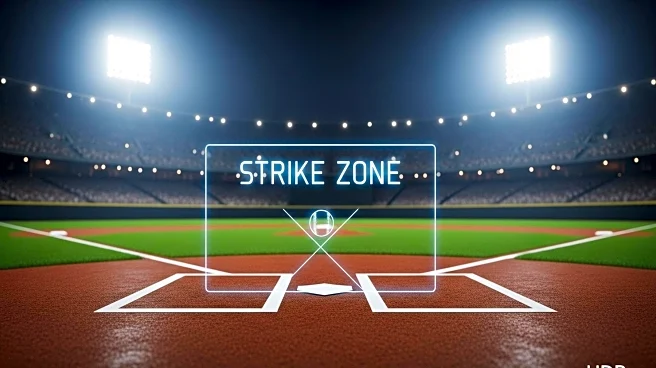What's Happening?
The San Diego Padres faced a disappointing end to their season with a 3-1 loss to the Chicago Cubs in Game 3 of the MLB playoffs. A significant moment occurred in the ninth inning when Xander Bogaerts, after hitting a solo home run, was involved in a controversial strike call by umpire D.J. Reyburn. Bogaerts believed he had drawn a walk, but was called out, leading to a heated exchange with Reyburn. This call was pivotal as it could have loaded the bases with no outs, potentially altering the game's outcome. The incident has reignited discussions about the upcoming automatic ball-strike challenge system set to be implemented in 2026, which players hope will prevent such errors in the future.
Why It's Important?
The missed call in the Padres-Cubs game underscores ongoing concerns about the accuracy of umpiring in MLB. The introduction of an automatic ball-strike challenge system is anticipated to enhance fairness and accuracy in the game, reducing human error. This development is crucial for players and teams who rely on precise calls to strategize and perform effectively. The incident also highlights the emotional and competitive stakes involved in playoff games, where a single call can significantly impact a team's season. As MLB moves towards technological solutions, the league aims to improve the integrity of the sport and maintain player trust.
What's Next?
With the Padres' season concluded, the team faces a challenging offseason, needing to address performance issues and strategize for the next season. The implementation of the automatic ball-strike challenge system in 2026 is expected to change how games are officiated, potentially reducing disputes over calls. Teams and players will need to adapt to this new system, which could alter game dynamics and strategies. The league will likely continue to refine and test the system to ensure its effectiveness and acceptance among players and officials.
Beyond the Headlines
The controversy surrounding the missed call raises broader questions about the role of technology in sports and its impact on traditional aspects of the game. While technology promises increased accuracy, it also challenges the human element of officiating, which has been a longstanding part of baseball. The transition to automated systems may provoke discussions about the balance between technology and tradition, as well as the ethical implications of relying on machines for decision-making in sports.









